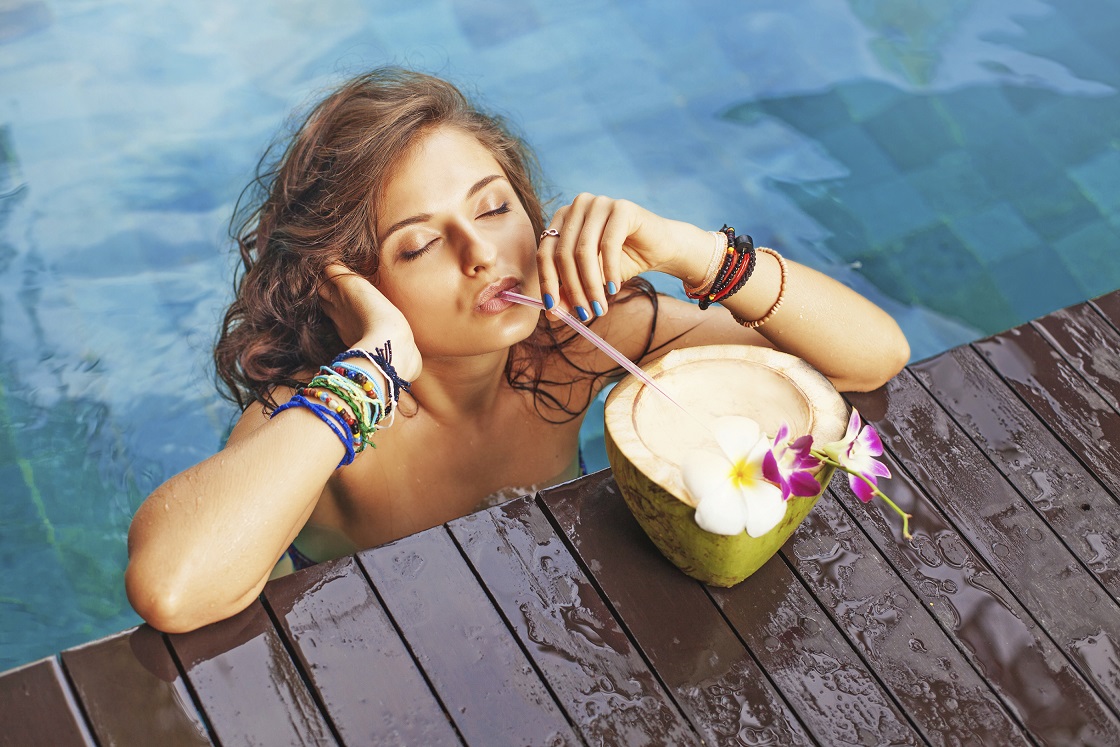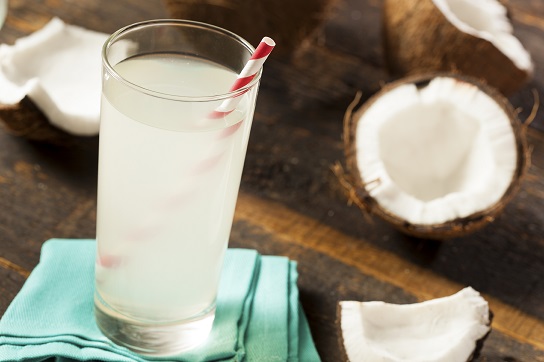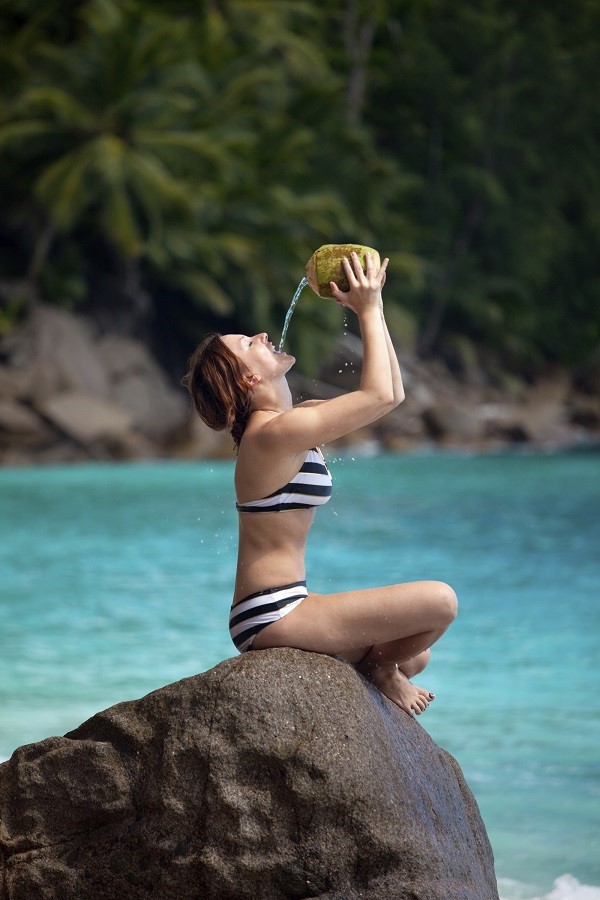 Recently, several plants that have previously gone unnoticed for millions of years have burst into the limelight as “superfoods”, foods with extreme nutritional strength.
Recently, several plants that have previously gone unnoticed for millions of years have burst into the limelight as “superfoods”, foods with extreme nutritional strength.
One which has particularly exploded in popularity is coconut water, recommended as a natural post-workout drink and often hailed as “nature’s Gatorade”. It all started back in World War 2, when according to legend, doctors giving blood transfusions to wounded soldiers realised they’d run out of saline solution to replenish their blood electrolytes.
In a last ditch attempt, they grabbed some coconut water instead, and were astounded when the troops fully recovered. Coconut water was dubbed a “human blood replacement”, and later, some gym rats theorised that its nutrient profile wound be optimal for replenishing the electrolytes (sodium and potassium) lost in sweat.
Since then, the public at large has caught on. Sales have rocketed; the Vita Coco brand went from $4 million in 2007 to $20 million in 2009.
Coconut water is believed to aid detoxification and be the most hydrating liquid on planet earth. Most importantly, it’s now getting celebrity endorsements for enhancing skin tone.
Does coconut have any powers for acne, or is it nothing but crafty marketing hype?
The acne nutrition is overrated
 First of all, to become a true expert, you need to know what coconut water actually is. To feast on coconut flesh, you first have to get a hammer or a screwdriver to pierce the “eye” on the outside of the shell.
First of all, to become a true expert, you need to know what coconut water actually is. To feast on coconut flesh, you first have to get a hammer or a screwdriver to pierce the “eye” on the outside of the shell.
Before you tear the nut apart however, you must first pour out the clear watery liquid within. THIS is coconut water; it’s very different from coconut milk, a mashed up concoction of both the coconut water and flesh.
Read Annihilate Your Acne – learn how to clear your skin permanently
Young coconuts contain a dramatically higher water content compared to older brown hairy ones. Pictures are everywhere of Thai holiday makers on green coconuts with a straw; that’s the coconut water they’re enjoying.
South East Asians have been drinking it since the sword-wielding, axe-throwing dark ages, but only since 2000 has coconut water spread to the West. It’s sold in bottled form, manufactured in South East Asia.
But is it really nutritious for acne? The answer is yes – coconut water features decent amounts of acne minerals like magnesium and potassium.
Nevertheless, the sky-high, wallet-emptying price tag instantly derails things. Consider these quantities per 240 gram cup:
- Vitamin C – 10% of the RDA.
- Magnesium – 15%.
- Vitamin A – 0%.
- Calcium – 6%.
- Iron – 4%.
- Vitamin B6 – 4%.
- Vitamin E – 0%.
- Vitamin B12 – 0%.
- Manganese – 17%.
- Selenium – 3%.
- Potassium – 17%.
- Vitamin D – 0%.
- Sugar – 6.3 grams.
There’s decent amounts of acne minerals in there. The origin story cooked up by manufacturers is that because coconuts grow on palm trees next to the ocean, they absorb all the plentiful nutrients in salt water.
Recommended – 6 vitamins and minerals which could finally clear your acne
Coconut water looks particularly great for magnesium, which helps acne by improving sleep quality, suppressing stress hormones, improving the insulin sensitivity of energy stores, and manufacturing glutathione. Because properly absorbed, acne-friendly sources above 10% of the RDI are rare, this is pretty good.
However, the big flaw is the cost. Just imagine dranking a 240 gram cup of Vita Coco (the cleanest brand) daily. You’d burn through over $40 per month, to obtain a small percentage of the RDI for one acne mineral.
You’d be far better off lazily using the Ancient Minerals Magnesium Oil supplement, which would empty your wallet by $10 per month, and easily provide the full 400mg RDI.
Coconut water would be better if its other acne nutrients were plentiful. However, the 10% figure for vitamin C is pretty dire considering that white potatoes, the staple carbohydrate source of Western civilisation, contains 64% per 200 gram serving.
Even a plateful of greasy fries from McDonalds would provide way more vitamin C. Coconut water lacks zinc, vitamin A, vitamin E, and selenium. It’s decent for manganese, but coconut flesh has more, with 75% per 100 grams.
What about the post-workout nutrition? It’s mainly down to the 17% content of potassium, a mineral depleted through sweating.
7 natural topical treatments which can massively reduce acne
Popular workout formulas contain both potassium and sodium, but the same is found in two bananas, some potatoes, or sweet potatoes. Bananas are a particularly excellent post workout snack. Anyway, potassium has minor roles in acne, such as in regulating inflammation, but it’s not as vital as selenium or zinc.
A waste of sugar calories
Contrary to popular belief, coconut water is not drenched in sugar.
240 grams contains only 6 grams, barely more than low sugar fruits such as strawberries or raspberries. What’s interesting is that coconut water tastes incredibly sweet when poured straight out of the coconut. I was once very weary of it for that reason, yet the nutrition tables are clear.
Nevertheless, the sugar is still enough to pile onto your daily totals. Acne patients have a limited sugar budget; your intake would be much better spent on antioxidant-rich fruits such as strawberries, raspberries, or even apples. Coconut water might have strong antioxidant activity:
ONE: this 2012 study gave mature coconut water to diabetic rats and observed a fall in oxidative stress. The antioxidant glutathione rose while lipid peroxide markers such as malondialdehyde fell.
TWO: this 2015 study found that coconut water prevented oxidative stress in drugged-up diabetic rats.
THREE: rats who previously ate a high-fructose diet drank tender coconut water (TCW) for three weeks straight. Markers of lipid peroxides fell, antioxidant enzymes increased, and there was a decent fall in blood pressure. Insulin sensitivity also increased (study).
However, it’s much smarter to blow your sugar budget on more documented superfruits.
Fruit antioxidants also have bonus powers; quercetin improves gut health, punicalagins in pomegranate lower cortisol, pineapple contains bromelain which enhances protein digestion. None of the coconut water studies were on humans either.
Then there’s the fiber issue, chiefly that coconut water contains none. The sugar in fruit is far safer than in a can of coke, because it is bound up in natural fiber structures that slow its digestion and absorption into the bloodstream.
Why bread and pasta are a massive cause of acne
When doing health research, it’s common to find a series of generic looking health websites which insist that any given plant-derived food is “rich in essential minerals, vitamins, and antioxidants”.
With coconut water, the laundry list which websites rattle off is particularly long. However, these websites are clearly getting the information from each other in a revolving door scenario, rather than looking at the raw data. Coconut water boasts many nutrients, but decent amounts of few, especially considering its costs.
An acne-friendly sports drink?
 But what if you’re a weight lifter, an aspiring athlete, or anyone that needs an energy boost?
But what if you’re a weight lifter, an aspiring athlete, or anyone that needs an energy boost?
It’s no secret that popular energy drinks cause acne; most are loaded with free floating sugar and extra sweeteners such as aspartame, which decimate friendly gut bacteria.
“Monster” energy drink brands contain up to 500mg of caffeine, equivalent to 6 or 7 cups of coffee. While caffeine is safe for acne in one or two cups of organic coffee daily, that much will send your blood cortisol levels soaring and virtually guarantee pimples.
Since coconut water contains neither high levels of sugar nor caffeine, it enjoys total immunity from these downsides.
The truth about dairy and acne
The next question though, is whether it’s an effective alternative. Some studies are optimistic. One found that coconut water enhanced with sodium matched a commercial sports drink for post-exercise rehydration. Another observed less fullness, nausea, and stomach upset, and easieness to consume in large quantities.
However, there’s a serious flaw: coconut water is lacking in sodium compared to commercial sports drinks. You lose a lot more sodium (salt) through sweating than any other nutrient. A refreshing drink of potassium and water alone will not cut it. The lack of sodium is why despite its usage in World War 2, doctors today say that coconut water couldn’t possibly replace saline. Anyway, coconut water was only really used as a last resort blood transfusion in tropical areas such as Singapore, where the British and Americans were beating back the Japanese.
Some athletes like to add sea salt to their coconut water, to create the ultimate natural post work-out. This would work, but you could add sea salt to any other drink. Additionally, a sugar-laden sports drink is the one instance where free floating sugar isn’t that bad for acne, because you burn it up through exercise so fast.
Then there’s a familiar foe: the $40 monthly price tag. You would be much better off bringing a bunch of bananas to the gym, which have a natural wrapper and contain just as much potassium. For the sodium you can add sea salt or Himalayan salt to your favourite beverage.
A good energy drink is a homemade fruit smoothie, which combines moderate amounts of free floating sugar with an avalanche of antioxidants and phytonutrients. Add some sea salt, and make sure the original mixture contains bananas or beetroots (both have lots of potassium), and you’ve just invented an acne-friendly workout drink, while casually bankrupting the coconut water industry.
Coconut water has interesting properties for ageing
That said, coconut water is not completely worthless. Possibly the most useful element is its abundance in a little known group of plant compounds called cytokinins.
Cytokinins are phytohormones, or plant hormones, which regulate the development, ageing and growth of numerous different species. Tellingly, coconut water is actually a secret of traditional Chinese herbalists, for watering crops including orchids and traditional medical herbs. By watering plants with the cytokinins within, herbalists claim to accelerate the plant’s cell growth and send profits through the roof.
The connection to skincare? When applied to humans and other animals, cytokinins have powerful anti-aging effects on cells and tissues. Treating cells causes a halt in the normal degenerative processes of ageing, slowing down overall ageing considerably. This works when applying coconut water topically, but scientists have also shown that a diet rich in cytokinins may succeed.
Read this article and learn why vitamin A is great for oily skin
Coconut water is the best natural source of cytokinins. Perhaps this anti-aging effect is why celebrities are going so mad for it. Maybe it’s a tightly guarded Hollywood conspiracy. Rumour has it that elite anti-aging professionals recommend coconut water to their expensive, globe-trotting clients too.
Even so, the water almost certainly has to be fresh out of the coconut. The pasteurised varieties imported, stored and sold over 4 weeks from Southeast Asia are probably sterile and useless.
Conclusion – nothing special for acne
The whole “superfood” phenomenon is not without nuggets of truth for acne; kale is very high in vitamin C and vitamin A, pomegranates are rich in antioxidants like punicalagins, and broccoli contains an anti-inflammatory molecule called sulforaphane.
However, coconut water crash lands right into the failed superfood category alongside chlorophyll and wheatgrass.
Coconut water is not unhealthy for acne, as its 6 grams of unbound sugar is pretty safe. Its magnesium, potassium and antioxidants are all decent. However, good quality (fresh, non-pasteurised, cold-processed) brands will turn you into a hobo within weeks.
Compare coconut water to sweet potatoes. By eating 400 grams every other day for some acne-friendly carbohydrates, you can get 24% of the RDI for magnesium. In the UK, that would cost you only £7.50 per month. Sweet potatoes are also vitamin A city, something that coconut water cannot claim.
My main coconut recommendation? Simply buy a whole one. Coconut flesh really is acne-friendly; it’s not quite a superfood, but the oil contains lauric acid, which has potent anti-inflammatory and antibacterial properties. Its selenium and magnesium are decent (15% and 8% per 100 grams) and it’s one of the greatest sources of manganese.
Coconut has repeatedly been shown to lower LDL (bad) and total cholesterol and increase HDL cholesterol. Here in the UK, a medium sized coconut is great value for money, costing just 80p. There’s enough flesh inside to last three days.
Finally there’s the best part – a whole coconut can give you half a small glass of coconut water for free! There’s no need to waste money on a bottle. It will be completely fresh unless the coconut itself is rotten.
What do I suggest you do with it? Drinking coconut water tastes great, but there won’t be enough within one individual coconut to provide much magnesium.
However, there will be enough to splash it on your face, to inundate your cells with cytokinins and potentially stay young forever.
NEXT: forget creams and moisturisers – discover the ultimate acne-clearing diet
Thanks for reading!

I have a lot of knowledge of coconut water.It is a natural and there has not any mixture in this which can be cause of our illness..so without any fear we can drink it.This water has a lot of potassium which is good for our health.I drink in summer season to get my body cool and relax.Thanks for sharing.
What about coconut milk? Does it have any superpowers?